Daydream Believers (Davy Jones Commentary) Script
(00:00:17)
Hey, how you doing? This is Davy Jones here. I’ve been waiting to see this movie now for about thirty-five years, because I can’t remember a thing that happened. No, actually, I remember a lot of it, and uh, maybe I can give you a little insight into some this uh, the story, here. Gotta understand, we had a great time. I mean, this was like the highlight of my, my life, and it keeps coming back and coming back and… We seem to be doing the same thing as we were doing all those years ago, and it’s just as much fun, so. Hey, it’ll be nice to see someone else do it. I, I understand these guys are good. They’ll never make it, though. Actually, that’s what they said about us.
(00:01:08) [The camera pans down a pile of scripts.]
More paperwork, that’s all we need.
(00:01:16)
Nice [???].
(00:01:22) [“It’s a TV show about young musicians.”]
Never work.
(00:01:26) [“They got a beach house or something?”]
Oh, a beach house?
(00:01:30) [“The gigs they’re playing, the girls they are dating.”]
Girls? A beach house? Gigs? They’ll have a hit record. I can see this now.
(00:01:43) [“Like the Backstreet Boys, N*SYNC.”]
Backstreet Boys, N*SYNC. Doesn’t strike a bell, really, to me. Catchy names, though.
(00:01:57) [“Musicians and actors? Funny, able to sing?”]
They couldn’t find anybody like that, so they picked Micky, Mike, Peter, and me.
(00:02:06) [“And you’re sure this has never been done before?” “Never.”]
Heh heh heh. I think it’s all been done before.
(00:02:15) [“The American Beatles.”]
That was the, that was, that was, I think, one of the biggest compliments when we were doing the show, that uh, people sort of likened us to Thee Beatles. Obviously, in our heads, it was kind of a bit bizarre, but we really uh, we tried anyway. We tried to simulate a bit of what they were doing, the fun that they used to put into their music and uh, appearances more than anything.
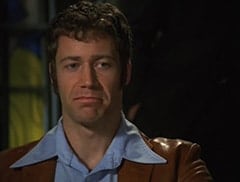
(00:02:42) [“Hand me a soda.”]
I guess this guy’s Bert Schneider. Coca-Cola.
(00:03:00) [“Nah, I’m not an actor. I just wanna play in a band.”]
Well, this is, this is true for the course with Peter. He always wanted to play in a band. And then when he was playing in a band, he, he still wanted to play in a band. It’s quite amazing, isn’t it, you know. I think with Peter, everything he tried to do, no matter what he tried to do, he was never satisfied at the end of it, and I think it was the closure at the end of it.
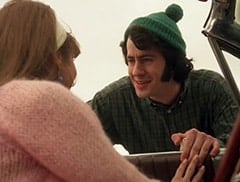
(00:03:27) [Mike arrives at the audition.]
The woolhat will never work.
(00:03:31) [Mike is talking to a pregnant Phyllis.]
And that’s not even his wife! Heh. Mike. You see, these uh, this was good at the time, because the hat came with the hair. It was all one piece.
(00:03:47)
You know, Nesmith um, I was at this audition. Mike did show up with his laundry, and it actually wasn’t at the studio at the time. PlayOh, here I come, this is me… I thought I was taller than that. Well, actually, Nesmith came in, it was at a, it was at a uh, a record company called Colpix, which was Columbia Pictures—Colpix, Columbia Pictures—and they used to put out uh, um, soundtracks to movies and uh, they had a num—a couple of artists. Nesmith was on the, on the label, and uh, I think Paul Peterson. Number of other… Eddie Hodges. Wow. There’s a name for you.
(00:04:35) [“You’re working with some of the best songwriters in the business right now.”]
And I think really, that, that was one of the keys to our success, what they’re talking about now. That’s the uh, the songs, and I think uh, that’s an improvement over the years. All those years later, it’s still happening.
(00:04:52)
I mean, I just realized that uh, Bert Schneider here, who, well, Bert Schneider was actually Abe Schneider’s son, who was the president of Columbia Pictures, so I guess we uh, we had a foot in the door to start off with, but um, Bert Schneider and Bob Rafelson were more into sort of uh, contemporary artists at the time and um, Buffalo Springfield uh, The Byrds.
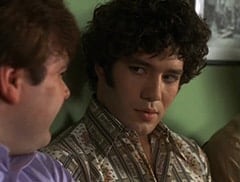
(00:05:25) [Micky is at the audition.]
I’ll bet Micky’s very, very happy with his casting. He has hair, this guy.
(00:05:32) [“You’re Corky, right? Corky the Circus Boy.”]
Ah ha ha. You know this uh, this TV show that Micky was in, the Circus Boy thing. It, it really actually never really came up that often during the press or the publicity promotions throughout the Monkees thing. It never really came uh, you know, as a question that was asked by the press or other people. Sort of baffled me, really, because I was a big fan of Micky’s when I was a little boy. Ha ha ha.
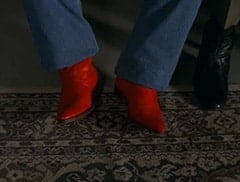
(00:06:03) [“I dig your boots.”]
The red boots are gonna work. Ah heh heh.
(00:06:14)
Well, there was about four hundred and fifty people actually auditioned for this, and uh, they sort of asked you weird questions and, dug into your uh, your past and uh, what your idea of the future for yourself was gonna be. They were cruel. Bert and Bob were very, very cruel. In fact, they were cruel to us, and we got the parts.
(00:06:49) [“Where did you get those stupid boots? Did you lose a bet?”]
That kind of stuff. They were always like that though. They never really actually um, once they got the show going, my, my, my uh, sort of um, my reading on the whole thing was that uh, you know, they sort of took it as if they could have used any one of those four people uh, that were—other than Micky, Mike, Peter, and myself. They narrowed it down to about twelve people and started uh, uh, sort of, pairing us all up at the auditions, and I think, I don’t know whether it was a fluke that Micky, Mike, Peter, and I where the ones that ended up together in the end, but we did. It worked.
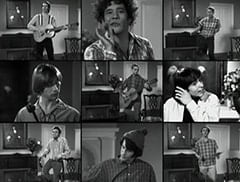
(00:07:49)
My um—Bert Schneider actually was quite a passive kind of a guy. He was laid back, but I think that was the brand of coffee he was drinking. I’m not quite sure.
(00:08:06) [audition montage]
That’s a Brady Bunch steal, isn’t it? Those boxes? Ha ha ha.
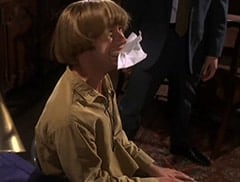
(00:08:16) [Peter has a paper airplane in his mouth during his audition.]
Peter was even trying to eat his contract in those days.
(00:08:22) [“You never know when this’ll come in handy.”]
Ha ha ha ha ha. My reading anyway on Schneider and Rafelson was because I’d come into the uh, into the flock with the pre, pre-auditions, and uh, um, they wanted fresh, new, they wanted it all to be them. They wanted to make the choices, and when I was there as a contract player from Columbia Pictures, and I had been for a number of years um, they uh, I think they sort of they like didn’t really, fully, hundred percent go with the idea of me being in it. I felt that at the time, and I even said to my manager, “Let me uh, let’s reconsider this one. I don’t think maybe this is the right thing for me”.
(00:09:19) [“These guys aren’t Ricky Nelson.”]
Oh, uh, and speaking about that, Ricky Nelson and Paul Peterson had already had TV shows with Screen Gems, so talking about the “never been done before”, these guys actually uh, had records with the TV shows uh, that Screen Gems had them in, and uh, so this was uh, another continuation of that idea.
(00:09:53) [“Now, we get to play our own music, right?”]
The—I don’t think that’s uh, [???] that question was ever asked, actually, by Nesmith. Not so early on. It was only later when we had success that everybody started uh, their different ideas about what was supposed to be presented and how it was presented to them in the beginning.
(00:10:31) [“Well, that’s… fantastic.”]
I didn’t get many lines in those days.
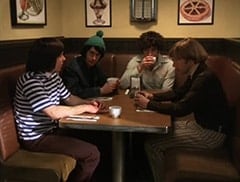
(00:10:33) [The Monkees are eating in a diner.]
Ha! This was interesting occasion. We were on our way down to shoot the pilot or get to know each other, on the way, and I wanted to uh, I wanted to stop at a seafood restaurant or uh, a place that was uh, a little less greasy.
(00:11:00)
It was a learning process. It was like waking up every day and getting to know these guys, and that was all the way through the shooting. It was like two years of doing it.
(00:11:08) [Micky, Peter, and Mike are eating rather messily.]
PlayAh, this is good, the way he’s eating here, Mick. It was twice as bad! Heh heh! And still is! Micky Dolenz, he’s, you know—Peter Tork, he’s a stabber. They’re both stabbers. They take the fork and stab at the plate. There’s bits of china going all over the place usually.
(00:11:27) [Davy begins cutting up his salad.]
PlayNow this is the proper way to do it, children! Pay attention!
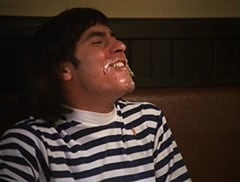
(00:11:34) [Davy starts eating with his hands.]
Ha ha ha! It really did happen. It really did happen, and then the fun started. It was food fights from there on in, no matter where we went. Well, there were a few games we played; I’ll let you in on those later on.
(00:11:56) [The Monkees are getting dressed for the pilot episode.]
Oh, the wardrobe department. Actually, our wardrobe man was a guy called Gene Ashman. It was not as exciting as it looks. We, we, we had this one guy who designed most of our clothes, and pulled a bit from here and there and, and this outfit was an outfit that um, that it was the uh, the, the corduroy pants, the yellow shirt, and the um, the little Monkee waistcoat. Um uh, and…
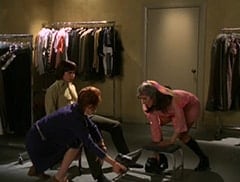
(00:12:38)
And um, Ward Sylvester was my manager at the time. We went over to Ciro’s, which is across from uh, the House of Blues on Sunset these days, and uh, we uh, we saw him one night, Sonny and Cher, The Byrds were playing there, and down the street uh, at the old Playboy Club, was uh, Little Stevie Wonder and Bob Dylan on the same bill. So we were going around town looking at all kinds of groups and people and, and… You know, Arthur Lee and Love uh, there was like a bass player in that band that was like kinda cool, and they looked at the um, um, Lovin’ Spoonful, you know. They looked at uh, Jerry Yester from uh, the Folk Quartet.
(00:13:43)
Finally the, I guess they came down on those guys, but the outfit itself was a uh, direct steal from uh, uh, Sonny Bono. He was wearing that when he was with Cher in the beginning when they were playing together.
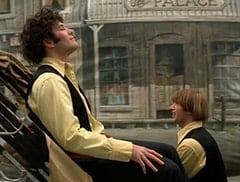
(00:14:01) [Micky and Peter are talking.]
See, why couldn’t they have stayed friends like this the whole time? Ha ha ha, ha. These guys, I dunno. I think when the beginning with Peter um, it was all strange to him. So you know, the music, music was his um, salvation, it was his uh, his comfort. Micky was used to being uh, on the set. Everyone knew him anyway, you know. All of a sudden, he was being uh, remembered ten years later, after the show had finished and same people were at the studio.
(00:14:43) [Micky is pretending to be a one man band.]
Kinda wacky. PlayI don’t remember those three girls.
(00:14:49) [Davy’s on the phone.]
Oh, it’s me. I’m talking to me dad.
(00:14:55)
We got letters all the time; I wrote.
(00:15:00)
I always wanted brothers. This is what I thought in the beginning. I thought it was gonna be like that. I thought we were all gonna sorta like, oh, here we go now, this is gonna be all for one, and one for all, and it was, until uh, I think until it got a little more successful. That was when you could make a phone call for a dime. That’s how long ago it was. PlayThis guy is good, I’ll tell ya. He’s very good. Heh heh. It’s like déjà vu in a way, but not quite. It’s like new déjà vu.
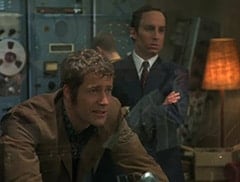
(00:15:41) [The Monkees are in the studio to record a song.]
This guy is uh, the head of the music uh, department of Screen Gems, Columbia Pictures.
(00:15:52) [“Guys, they promised we’d get to do our own music.” “Don’t worry, Mike, we will. It’s just for these early ones.”]
We were just making a pilot really, and uh, really, you know, time is the essence and money is uh, quite important. So really, it was just like a, more of a, you know, a presentation of uh, you know, what it was, what was to come. That’s what we all thought really in a way.
(00:16:23) [“Keep Peter away from the microphone, that’d help.”]
Ha ha ha ha, ha ha, ha ha ha. PlayNo more short jokes, okay! That’s it! They’re all going over my head anyway.
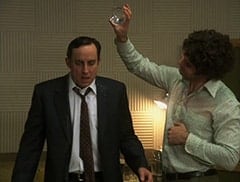
(00:16:38) [“Van, who is this guy?”]
No, well, Kirshner, when he came in, he was really a very important man in the music business, and that actually did happen. Micky did actually pour a glass of water over his head, not really knowing how important he was to everybody.
(00:16:55)
But Kirshner, really, he really was uh, Mr. Music. He was uh, he was the guy that everybody took their tunes to, because he had the access to uh, a lot of artists that uh, required tunes. Actually, that—the problem was soon after The Monkees uh, um, there was most of the groups were doing their own songs and singing their own material, so you got Carole King and Neil Diamond, Harry Nilsson, Neil Sedaka, Carole Bayer-Sager, Leiber and Stoller, Barry Mann, Cynthia Weil, Tommy Boyce and Bobby Hart… all these guys uh, um, came into their own at the time, because they had songs that uh, they’d written that nobody was doing. Because you know, Neil Diamond was a singer; he was a songwriter. Carole King wasn’t a singer; she was a songwriter, and so, you know, when all the groups started to do their own material, then there was no place for them to place their tunes until The Monkees came along and, you know. Over the years, when I look back and um, read some of the comments from some of the uh, uh, songwriters, you know, Neil Diamond, “I wish I’d have done it”, you know, Carole King, you know, “Anybody could have done it”, or whatever they said, you know, I mean, it’s kinda really backhanded, really, after the success we’d given them as well so. One hand feeds the other.
(00:18:25) [The test audience is watching the pilot and not enjoying it.]
PlayIt was brand new for the audience. People really didn’t get it, you know. It was, it was like modern day, as John Lennon said, he said, you know, “It’s not like The Beatles at all; it’s more like the Marx Brothers”.
(00:18:36) [“Whatever, Peter. It’s a little too cosmic for me.”]
And Mike was always the guy out there stirring the ladle, you know. When things were going good, that’s when he stirred harder, and I, I had no idea why. We don’t, didn’t know much about him.
(00:18:52) [“We just officially became the lowest testing pilot in the history of NBC.”]
We actually weren’t invited to the pilot. We weren’t there when they showed the pilot, and so, I thought when we’d done the pilot, the first episode, that it was gonna be presented to the networks and the studios around the country so they would um—it was already sold, but no, it wasn’t the case. I knew very little about television. I’d done a few things, you know, Farmer’s Daughter, Brady Bunch—not, well, The Brady Bunch came later, but um, Ben Casey uh, all those kinds of early sixties uh, sitcoms. Sitcoms.
(00:19:33) [“But they’re so different!”]
Well, when you think about it, four, four, well, it’s not—they’ve got like those TV shows like Friends and things like that where they’ve got three or four personalities out there, so, I guess it’s different these days. You know, it was just like one star of each show.
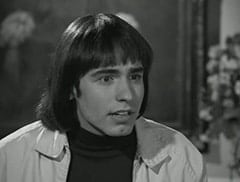
(00:19:54) [“I make a terrible sound, but, you know.”]
Well, when they asked me what I used to think my musical uh, direction was, I always said Broadway rock: a little bit of theatre, a little bit of rock and roll, which is more or less what happens uh, in the seventies, with people like Bowie and Alice Cooper and other theatrical presentations. So I was on the right track, just no one heard me.
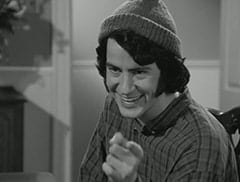
(00:20:13) [“That’s your hang-up, man.”]
PlayThis guy’s a dead ringer for Nesmith… but he’s a lot nicer. Ha ha ha, ha ha ha. Ha ha.
(00:20:22)
I actually lived with Micky. We had a house during the period in between this pilot and the time we went on the air and started shooting six months later. It was a uh, very—a tough time, a very tough time.
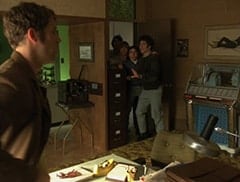
(00:20:42) [“Woo hoo! Thank you very much.” “It’s another trick.”]
What is it, guys? You—it’s work—we’ve sold it, but we’re not gonna pay you! Oh, we’ll do it anyway! Ha ha.
(00:20:55)
I was told that what they did with the pilot was that they took it home, they cut it up into pieces, and then they just stuck it back in any order. Now in reality, that obviously wasn’t right, but more or less, that idea.
(00:21:12) [“This time next year, every kid in America is gonna know The Monkees.”]
And really, the camaraderie and all this like excitement um, around the producers, Schneider and Rafelson, it was all individual. They kept us separate. Divide and conquer, that was their motto. That was their, that was their way of doing things.
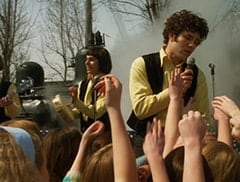
(00:21:38) [“How did you do this? The show hasn’t even aired!”]
Oh, this was cool. We, we rented, we got this train and we went to San Diego or some place, and we played on the train. They kept bringing like forty, fifty in at a time into the caboose and, we’d play, and they’d take them out and then forty more would come in, and I think they named San Diego Monkeeville for the day or something. I can’t remember what really happened, but this was an exciting time. They had they built us a Monkeemobile too, with a little trailer that we pulled on the back. And uh, it’s supposed to open, the four sides flapped down, and that’s where the show started, you know, like pop-up amps and everything else, because I guess they were thinking we were gonna, you know, mime everything, and that was the way they did it in those days.
(00:22:32) [The Monkees are performing “Last Train to Clarksville” outside the train.]
And this was actually on the train itself while it was moving. That’s when we did this. It wasn’t uh, sorta that concert there. I think at the time too, with The Beatles and all the other groups that were happening, I think really um, um, being accessible uh, um, to um, the audience The Monkees um, had uh, that they probably really had never screamed for bands before. They were too young for The Beatles or um, we were in that in between time, after us came um, you know, The Cowsills and um, The Osmonds and um, um, The Jacksons, The Silvers. You know, all those kinds of—The Partridge Family later on and, you know. We were sort of like, you know, the, the guys uh—this is what we projected, I think ou know. We opened a few doors for other people too, so.
(00:23:53)
I never saw Schneider and Rafelson smile so much. It is a compliment, you know, to see people imitating yourself on the screen. It’s almost like, you know, one of those things. I mean, how many people, you know, have that as a, as a memory? So this is, this is, the, the, the movie itself is good fun, and I think it’s well done. Um, I think the guys that played the parts, the, the four uh, principals here are all just, you know, good, very good. You know, some of the things that are said and are done are not quite the same, but you know, for the most part.
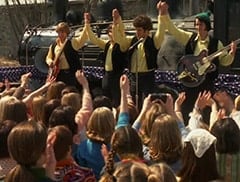
(00:24:46) [The Monkees take a bow after the show.]
This was the most exciting time and always is, when we all hold hands and do our little bow together. We did it at the Greek Theater back in eighty… ’87, ’88 when we played there uh, all four of us on stage.
(00:25:03) [The Monkees are filming the episode “Don’t Look a Gift Horse in the Mouth” on a farm.]
And my favorite times was always outdoors, when we filmed on location. I’m an outdoor person.
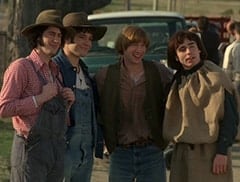
(00:25:14) [“And uh, no man, or padlock, should stand in the way of art.”]
That’s funny, th—you know, this is so far out, because um, Nesmith is sort of like—in the movie here, this guy is, is talking sort of like, quite nasal, and it’s funny because Nesmith did at the time, because he had a tonsil problem, so that’s kinda like uh, that’s kinda interesting.
(00:25:39) [“Don’t worry about it, kid, we got everything under control.”]
And it was never really that, because these guys were um, actually—Bert and Bob, were only a few, four, five, seven years older than that we were, so it was never that sort of like, you know, we were sort of… If they had treated us a little um, less sort of uh, adult, keeping us in the dark, like mushrooms, really um, instead of uh, instead of actually uh… They used us a lot. It was great fun. We did a lot of silly stuff.
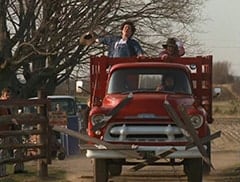
(00:26:19) [The Monkees drive through the locked gate.]
Ah ha ha. That was a different occasion, really. We, we didn’t really go blaring through there in the truck. It was uh, an occasion that happened to me at the studio when I was uh, when I was uh, late for, for filming one morning, and they, they uh, a guy wanted my ID. I didn’t have it, and he wouldn’t let me in the gate. I told him, “You better let me in, otherwise I’m gonna blow through here”, and I did, and the [???] um, about a foot of it went up and down all day long after that, you know, until they fixed it the next day.
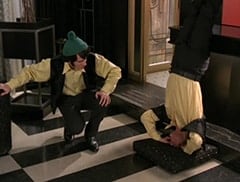
(00:26:58) [“This is how you prepare for a meeting with network affiliates?”]
Ha ha. Peter was Hare Krishna, waterbeds, brown rice, you know, love, peace. Well, we all were really, but you know, that was the times.
(00:27:15) [“Yeah, it’s the establishment out there.”]
Yeah. It was all pretty fr—it all happened, you know, awfully quickly, and uh, now it’s, it seems like it’s in slo-mo to me.
(00:27:35) [“They’re all afraid he’ll do his James Cagney impression.”]
PlayYou dirty rat. You’re the guy that gave to my brother.
(00:27:53) [“You dirty rat! You’re gonna pay for that!”]
Ha.
(00:27:49) [A sign reads “Welcome Network Affiliates”.]
“Network… Affiliates”. We had these little girls—these little girls—these young ladies called Monkee Maids that went around, and they um, uh, you know, they had the signs, and they had the cards, and they had the uh, the dialog “The Monkees is coming”, “The Monkees is coming”, and, you know, people say, “Doesn’t, shouldn’t it be ‘The Monkees are coming’?”, but uh, drew attention to the whole thing. It was pre, pre-promotion, you know, before the, the event.
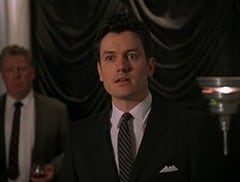
(00:28:23) [“Out. Now.”]
Yeah, we, we were kind of looked down upon, so therefore, it was another sort of like, reason for us to, to sort of like, be even more sort of silly and laddish, but you know, hey, you can’t turn that kind of thing on and off. You’ve got to be uh, you know, part of the program. We were trying—busy trying to be friends and busy trying to entertain at the same time and all those things. There were many occasions when we all were out there playing uh, um, softball on Sunday afternoons over in the valley in Los Angeles and uh, Mike never joined us. He joined us maybe once or twice. That was it. But for the most part, it was Micky, Peter, and I. And off to Micky’s pool for a swim with the kids.
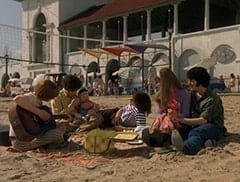
(00:29:13)
Phyllis Nesmith. She was a wonderful lady. Great girl. I remember little Christian and—Mike’s son. I guess uh, looks just like him. Christian uh, PlayMike was a Christian Scientist and his wife too, and Christian was very, very sick. He had yellow jaundice or something. I snuck him to the doctor’s. Oop! I shouldn’t have said that.
(00:29:42)
Yeah. We all had daughters around the same age. Between us, I think we got twenty kids. I’m not sure. Maybe more.
(00:29:56)
I always thought they were all a lot older than me. Mike Nesmith used to learn a word a day. He had a dictionary. A word a day, and he’d try to use it as often as much as he could throughout the day. You know.
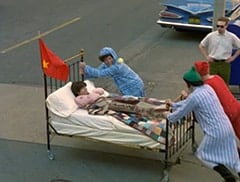
(00:30:14) [The Monkees theme montage]
Sweet youth. I like the way they’ve put all the uh, little bits and pieces together and taken the key little elements of uh, the whole experience. The memories, all these little moments, you know, that uh, that people recognize. You know, it’s like uh, it’s like a uh, a comedian or an artist having like a catch tune or a catch phrase, you know, um, Bob Hope uh, you know. Dean Martin sort of always having a drink in his hand, and Sammy Davis having a cigarette, you know, it’s sort of like…
(00:31:07) [“Aaand… cut. Print that.”]
We played all the time on the set. When we weren’t filming, we were in a little room. A little black box, we called it. It was a soundproof room. We played all the time, you know. We, we just practiced and rehearsed, and although it was taped music when we were filming, it was not uh, uh, something we weren’t working on, and we were working slowly towards uh, all of us uh, doing our uh, own music. In a sense, playing our own music.
(00:31:38) [“Way to go, Donny!”]
When I first heard “Last Train to Clarksville”, I was with Micky Dolenz, driving down Benedict Canyon in Los Angeles in his Mustang. He had a green Mustang, a fastback, and we just stopped the car when we heard “Clarksville” on the radio for the first time. This was before it was a hit. We were together. It was unbelievable. I guess it was like being in a college dorm half the time, you know, just having to consider other people and… so many roommates.
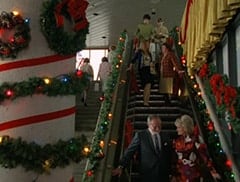
(00:32:21) [Micky and Peter are mobbed in the mall.]
There weren’t that many girls around because all our fans were quite young, you know. There wasn’t sort of like, you know, sort of like, backstage parties, you know, where everybody got sort of like crazy. We were so busy traveling and working. It was very little time to do anything other than The Monkees for about two years straight. Three years straight. And um…
(00:32:57) [“We do a concert.”]
We did a lot of concerts. We weren’t the greatest band in the world, but, you know. In fact, when we played the national anthem, people from every country stood up, so. What can I say?
(00:33:13) [“People rehearse months before doing a show like that.”]
We were rehearsing, rehearsing, rehearsing. We were a good band, and uh, I’m not well impressed by many bands, but I was very impressed by the way we played together. And not just because I was in it. We did play good together.
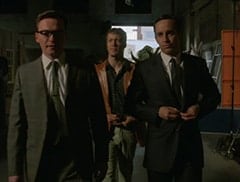
(00:33:39) [Van, Harris, and Don are discussing the group doing a concert.]
They really didn’t get along, these three guys, and with Schneider having that in with his father being the boss and I don’t know what was going internally, but uh, he was always uh, my idea or nobody’s was, you know, for the most part, you know, that was each one of those guys, you know. They, they never compromised. Rafelson, Schneider, and uh, Donny Kirshner.
(00:34:33) [“It’s just a bloody song.”]
I don’t think we ever criticized each other uh. We always helped each other. Peter was very, very helpful to me. He always, you know, complimented me on my, my um, my technique as far as music and, and, and being able to relate to it and, and keeping the beat and keeping the, you know. I was uh, perfect pitch and all things like that, so, but that was from my years of schooling on the stage, so.
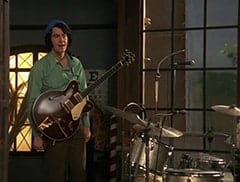
(00:35:06) [“You guys can’t handle that? Huh?!”]
And that—it would have been nice if Mike had been a little bit more vocal, which he never really was. It was all insular. He was always in his own little room, and he was never there, you know.
(00:35:17)
First year, I mean, the first year uh, we were together, I remember Christmas time, I bought all the guys a little color TV. Not too many color TVs around in those days. I went over to Gene Ashman’s house for dinner one night. I said, “That’s a nice TV. I bought the guys one like that”. He said, “Oh, Mike gave me that”. Ha ha ha, ha ha. You know, he never wanted to be part of what was going on. It was such a sad shame because there could have been a hundred guys out there that would have probably have just like eaten it up instead of fighting the feeling, but I guess there was qualities that he brought to the band, and obviously because publicly, the public, I mean uh, were very um, endearing to him, you know. He had his style, his image.
(00:36:04) [I don’t honestly know what bass he’s talking about here, but Peter is playing one in this scene.]
And I still have the bass! I have the original bass. I think there was only a couple of them made too. It’s a shorter bass than uh, the basses they have, you know. Which I think would be a good thing to have that right now, actually.
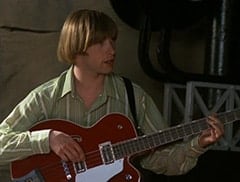
(00:36:22) [Peter plays the bass.]
Wow. Mine’s a red one too.
(00:36:34) [People are going into The Monkees concert in Hawaii.]
Our concerts were always, just like, crazy. You couldn’t, didn’t matter if you could play or not, because you couldn’t hear a, you couldn’t hear a thing. You were out on the stage there. We talked to each other on the stage, you know, I mean, you know, and it didn’t really matter, I mean, and the sound was coming out of amplifiers that were um, just, you know, just regular amps on the stage. There was no sort of like speakers in the auditorium or, I mean, it was—Well, if you ever heard The Beatles at Shea Stadium, you know what I’m talking about. I think this is a dir—the shirts are a direct steal from um, from a John Wayne movie. I’m not sure, but they gave us loads of clothes and…
(00:37:25) [Davy is singing “I Wanna Be Free” on stage.]
PlaySounds just like me, doesn’t it? Heh. I must say, I mean, through the show, I mean, all the, all the boys that are in it here, all these guys, you know, did a heck of a job.
(00:37:46)
And in fact, I was uh, watching the show the other day um, The Monkees’ TV show, with one of my daughters, and I was doing my little Davy Jones dance, and my daughter says to me, “Dad, why are you dancing like Axl Rose?”. Ha ha ha ha ha! I said, “Axl Rose? Been there, done that, got the t-shirt”.
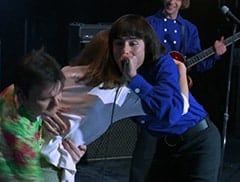
(00:38:11) [A girl runs up on stage during the concert.]
You see, these were the only encounters we had, you know, with little thirteen year olds on the stage.
(00:38:27)
I think it, to me, it’s all to do with presentation anyway, you know. If you listen to some of the live albums or you hear people out there now these days, and you actually play it back, I think it’s, it’s unfair to uh… Live performances, you’re taking a risk no matter what you do. The equipment’s so superior now anyway, and you got all the earplugs and all the stuff that you can use, but um. Peter Tork, gotta be the best musician in the band. He played guitar, bass, drums, you know. He played some wind instruments, and uh, you know. On the right material, he was really like the Ringo of the band as far as the vocals were concerned, but very talented. Very, very talented musician. Um, and as I say, always supportive, and uh, he bought me my first guitar. I’ve written over two hundred songs… and that was just this morning.
(00:39:29)
I remember the first concert. It was in Hawaii. We were at uh, Miss Teenage America. There was three thousand screaming kids, a built-in audience. Dick Clark, the famous Dick Clark, promoted the first five of seven concerts, and then Screen Gems took over. I’m not sure if they had an agent’s license, but they took over. It was amazing. Actually, I met my wife there uh, Linda uh, my first wife. I loved Hawaii. I’d been there a couple of times before.
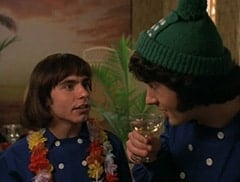
(00:40:04) [“On our next album, we play everything.”]
I love the little buttons on Mike Nesmith’s hat. It’s sort of matching the shirt.
(00:40:19) [“Van, we were supposed to have more input.”]
There was a lot of this sort of like, all of a sudden, getting the info, instead of calling us into the office and talking and being a little delicate, you know, with the uh, with the stuff. Donny’s obviously being made out to be the bad guy all the way through this, but you know, he had a track record, and he had a way of doing things and so. He just didn’t get it because, you know, I guess he was protecting his um, protecting his um, position, you know, and that’s only quite right. We all do that all the time.
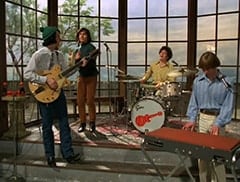
(00:40:53) [“I’m a Believer” around-the-world montage]
VOX piano. And Peter always wore his belt buckle on the side.
(00:41:08) [A bunch of fans at a concert are jumping and screaming.]
It was like this. It still is like this. It’s quite amazing. You know, The Monkees went to thirty-five, thirty-seven countries around the world a show, maybe more. Played all over the world.
(00:41:21) [The Monkees come out of the amps on stage.]
And to me, that was the greatest, we came out of those big VOX amplifiers. The show started, and then we burst out.
(00:41:32)
I think the record um, “Clarksville”, our first record, was number one uh, before the, the week the show hit the air, so it was, it was quite, it’s good, good, good music.
(00:41:50)
PlayThat’s how I used to keep my waist so slim, you see, all that little Davy Jones dancing there, backwards and forwards. I guess I should do it a little bit more often these days.
(00:42:09)
It was all pretty raw, but it was all, you know, it was to the point, you know. How complicated did it have to be? We never sang songs about, you know, the civil rights. We didn’t sing songs about the war. We didn’t songs about, controversial songs, you know. We thought about it, and were involved with a lot of that, you know, sort of uh, protest, you know, but uh, our music and our presentation as The Monkees was just straightforward, family entertainment, you know, and um, I think if you can focus on that, then uh, then you’ve got something that you can work with, you know. You’ve got to know what the beginning is and, you know, your responsibilities. We were never told, we weren’t—as we got more successful, and the show took off, and there were more fans and more dates, and that’s all there was. Nothing changed. And we were, we were just like contract players making um, a pay packet every week. And uh, the excitement of doing it never uh, ever gave us focus on the other side of it, you know, the future, the business, the… but then again, how many actors do? Not too many, you know. You’re an actor. You were hired to do a part, you know. But uh, we didn’t have agents. None of us had an agent. Well, Mike had an agent, Jerry Perenchio, who went on to promote the first um, Muhammad Ali–Fraser fight on um, the closed circuit um, television screen um, and then a few more after that. He started that, so. We were around good people that were doing, you know, innovative things all over the place.
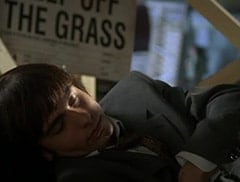
(00:44:07) [Davy is sleeping on the set.]
I think it must be the second season. Ha ha ha ha.
(00:44:19)
I had a little uh, dressing room on the set and um, you know, some had like a chair and a couch, and uh, you know. I think I had bunk beds in mine, ha ha ha. I’m not sure.
(00:44:34)
They made us those suits. We all had these suits, you know. I guess that’s a spin-off once again of The Beatles, the suits and ties and stuff. I think it’s—we got them from around the corner of the studio. There was this shop. We used to go in there and just like order a four hundred dollar pair of boots. I’ll put it on the bill, you know, thinking that that was that, but you know, wow, it all came out in the end. Even, they took the cars back, the bikes, the clothes, everything.
(00:44:55)
Tie and the [???].
(00:45:02) [“The Buddhism, free love…”]
Free love. I was once at Peter Tork’s house, and uh, it was, the pool was full of people. Naked. Jim Morrison was at one end of the pub—uh, pool. Ha, yeah, the pub. He’d been in the pub all night I think. I’m not sure. He had a bottle of something in his hand, and Barry McGuire, “The Eve of Destruction”. Stephen Stills. Uh, man, it was lots of times we hung out with lots and lots of people. It was more of uh, a fun party for everybody. We used to see like say uh, The Association or um, we’d see The Turtles, you know, Mark and Howie, and more or less like, “’Ey, we’ll knock you off the charts next week, mate”. It was not sort of uh, run by the lawyers and businesspeople. I guess it was, but, you know, it seemed a little more freeform, I guess.
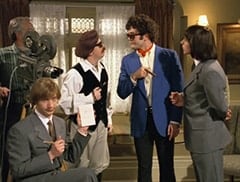
(00:45:45) [The Monkees are filming the episode “I’ve Got a Little Song Here”.]
Ha ha ha, gotta be Rip Taylor. He was the coolest. We had some great guest stars, you know. Rose Marie and um, uh, Huntz Hall from the uh, Dead End Kids, The Bowery Boys (Huntz Hall did not appear on the Monkees’ series.). Um, who else? I can’t really remember. There’s so many good people though. We were lucky. We always had good guest artists and funny character people and—I always thought—I was—I admire Micky. I admire Micky very, very much. I think he’s a great actor. He’s obviously a great singer. He’s probably one of the best voices in pop, always has been. He can sing all night and just keep going and going and going, and he’s got a great range.
(00:46:53) [“If we’re not playing our own instruments, we’re gonna be in a lot of trouble.”]
That was the problem, you know.
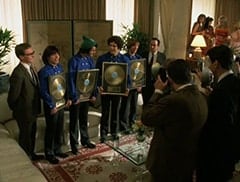
(00:47:04)
I remember this, you know, it’s so tough to get that. We, we, you know, we were told—Playwhen we talked about the war, we’d say, “You know, well, you know, we’re, we’re not soldiers, you know”. When we talked about drugs, we said, “Well, yeah, we drink Coca-Cola”. But that question kept coming up, you know about, “You don’t play. You can’t do it”, but, you know. Little did everybody know, neither did The Beach Boys, you know. They, they didn’t play any, you know, in their studio sessions uh, The Association, The Turtles, The Byrds, believe it or not. Well, of course, all the other bands like Sonny and Cher and um, you know, sort of like The Carpenters and all, later on and, and other bands um, um, they obviously uh, had studio musicians. They had a group of musicians called The Wrecking Crew. The Wrecking Crew was um, um, five key musicians, you know, Glen Campbell, Earl Palmer on drums, Larry Knechtel on bass and um, just different great, great musicians, and if you look at albums from the sixties and seventies, you’ll see these names all over the place, but uh… This, this was a course that these guys held onto, and eventually, it destroyed our relationship with the studio, with each other, and Mike Nesmith was in the studio in ’67, producing and doing his own stuff. Even then, he’d sorta started to, you know, separate himself.
(00:48:17) [“I am not putting my name on other people’s music.”]
It—Didn’t get it. It wasn’t the case of putting your name on other people’s music; it was the case of, you know, you know, playing the part of a rock and roll singer in a band. It just happens that we were. Yeah, I play the trumpet too, but they didn’t have me play the trumpet on the shows.
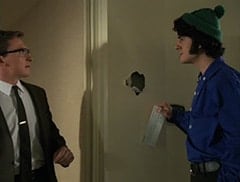
(00:48:29) [Mike punches the wall.]
This was at, at the Bel-Air Hotel, actually, the Beverly Hills Hotel.
(00:48:34) [“You see that? That could have been your face.”]
PlayIt could have been a beam too, Michael. Ha ha ha ha ha. That would’ve hurt! And I said to Lester Sill, who was the second in command after Donny Kirshner when we left here—There was a guy called Herb Moelis who was the lawyer, and he got very aggressive in that meeting. He really upset Michael, and that’s why he punched the wall. He telling me, “I can sue you. Your name’s on a piece of paper”, and, you know. We weren’t used to being talked this way, and Bert and Bob were not with us. They just sent us to the wolves at this point. I had no idea why.—And I left with Lester Sill, the, the um, the second in command, who became the first in command because Donny Kirshner was fired, and as we walked out of there, we looked at each other and I said, “This is it. This is the end, isn’t it?”. He said, “I think it is”. You know.
(00:49:19) [“What if we blow it?”]
And we did! But then again, what can I say? What is “blowing it”? I mean, it’s rerun and rerun and rerun. PlayI mean, I’ve been Davy Jones from The Monkees for almost forty years now. Live with that one. Eh, it’s not so bad.
(00:49:33) [“That’s because we were a real group.”]
We were a real group too.
(00:49:42) [“Mutiny? All of us quit the show?”]
Yeah. Well, we didn’t really know that he’s got himself about fifty million dollars waiting in the bank down there, you know, so he was easy to quit the show. We were struggling for the rents at four hundred and fifty dollars a week at this point, you know. First year, that’s what we made, but, you know, better than we could’ve made down at the uh, Burger King or some place, you know. That’s where most musicians are until they get a crack at the uh, you know, the, the right people who will put you in the right place.
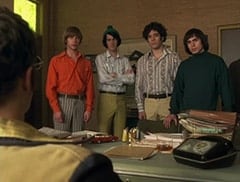
(00:50:18) [“We don’t want to take over the show.”]
We just want a better respect, ha ha.
(00:50:38)
Well, soon after this, actually, when we went in and we cut this, and we did actually do an album—Headquarters was the name of the album—um, Bert and Bob um, started to look at the budgets on, on these recording sessions, because they were looking at our budget, what we went into, to make an album, which I think came under what anything they’d done before, and uh, they stopped um, um, Carole King and Neil Diamond and Harry Nilsson and um, and um, Tommy Boyce and Bobby Hart from just going in and cutting their songs when they wrote them, you know, and then billing us um. That was all part of the shake-up, you know. I mean, they were learning too as they went along. They’d never ex—the studios, they’d never experienced anything like this before, so therefore, it was um, you know, a learning process for all of us. Micky Dolenz—we played Wembley Stadium and uh, we played um, big arenas all around Europe uh, uh, and England, and Australia, Canada—and I can honestly say, you know, I mean, for not having been a drummer at the time, certainly can pound it out now. Great, great, great, basic, in your face drummer.
(00:52:00) [The Monkees are performing “(I’m Not Your) Steppin’ Stone” in concert.]
I think the sound of The Monkees came from Tommy Boyce and Bobby Hart. You know, they were the—in fact, when we did the pilot film um, and I’m not quite sure whether it was the one that was aired um, they actually did the singing. They sang um, a number of the tunes um. I’d have to listen to the pilot again to see if I can hear us, but uh, I know Tommy and Bobby sang a lot of their initial music uh, and we weren’t paying much attention to it, other than the fact that uh, there was a bit of a problem with Peter and Micky—Peter and Mike, and uh, that brought more attention to it.
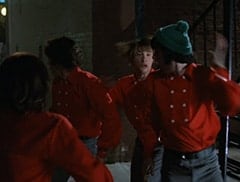
(00:52:58) [The Monkees are being chased by a bunch of fans around the hotel.]
The girls chasing us all over the place, the, you know, sort of like the isolation, you know, you know. PlayWhere’s the bodyguards? Ha ha ha. We don’t have any! Ha ha.
(00:53:24) [“You better have a damn good explanation!”]
Ha ha ha ha. Well, we do! Four thousand girls chasing us. Actually, we were in London, Micky and I, and um, I took him for a walk around uh, um, uh, in this particular area, which, kind of trendy area, with all these like trendy shops, and we got chased and uh, went into a pub and got chased out of there and finally headed to the hotel. Back door wouldn’t open. Ran to the front, two big glass doors, and I can honestly tell you, we actually pulled the doors off. This was like with fear of so many people on our tails, you know, chasing us. It was a game, but it was not always as um, comfortable as you’d want it to be.
(00:54:22) [Davy is playing the tambourine.]
Ah, the best—PlayDavid Letterman, he voted me the number one, number four, and the number seven tambourine player in the world. Ha ha ha. Kinda cute. I loved the concerts because it was, that’s where, you know, the live music for me was uh, and I was so proud of these guys, because they were so, so good. I’d never really, see, I’d never really been in a rock and roll band. I never really known how good a musician should be, but to me, they were, they were great. They were, you know, top of the, top of the heap, but it, for those guys, it had to be all or nothing. The concerts were absolutely wild.
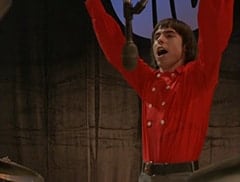
(00:55:26)
Ha ha ha. We couldn’t hear a thing. There was never anything you could hear. You couldn’t hear nothing. And that was always my fun time, when they said that I could get up and play the drums. I wasn’t a drummer either, but I certainly could play “Stepping Stone”.
(00:55:54)
I guess Micky even started that whole thing where they’re jumping in the crowd, and they’re passing you all over the place. Look at this! It happened! Far out. PlayI’m a drummer! I’m a drummer! It was kinda dreamlike, the whole thing.
(00:56:23) [Van, Harris, and Don are discussing the group.]
You see, there must have been a lot of this going on behind the scenes. I never knew anything about it. All I knew is that, you know, Mike Nesmith was terribly unhappy about the music, and that became the main focus of our problems, really, and we shouldn’t have really had any problems at this point. We should have been just doing a TV show and making records and touring and doing interviews and… being chased by the fans. Heh heh heh. But Bert and Bob obviously were into other stuff too. They were starting develop other projects and stuff.
(00:56:53) [“Do you think you’d even have a show if not for the music? The music is the reason these jokers are a success.”]
Here we go now. I wonder if how many times we were called jokers, not only by Kirshner but the other guys. Oh, don’t—“Those guys, doesn’t matter, they’ll do what we tell them”. And for the most part, we did.
(00:57:09)
I think they put a single out at this point in Canada, you know, um, My Favorite Monkees, Davy Jones or something, you know. They put “A Little Bit Me, A Little Bit You” out, or a Neil Diamond tune. But then obviously, you’ve got all these publishers that own the rights to these songs, whether they be the top songwriters, and they must be making phone calls to Kirshner and to the music department of the studio, you know, wanting to get their artists’ songs into the show or own our records, so… and I knew nothing about any of that. All I knew is that, you know, if my check was uh, two hundred and forty thousand dollars the first time out, Mike Nesmith’s must have been twice as much as that, because he’d written three or four tunes on it. He was very smart. He wasn’t a team player, but he’s very smart as far as his own situation, but then again, I’m not sure where his career is now.
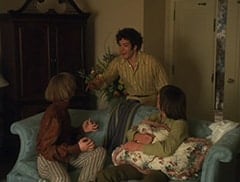
(00:57:59) [The Monkees are hanging out in the hotel in London.]
We really enjoyed playing together, and these are the most favorite times, when we really were together, enjoying each other’s company. Micky and I “pal”ed out more than anything. I think he and I—as we do now, we’re still good friends and enjoy each other’s company, so. I’m not sure um, because we all had our own little cliques going on, you know. We had our own little entourage of people waiting for us at home or who used to go out partying with us or clubbing or…
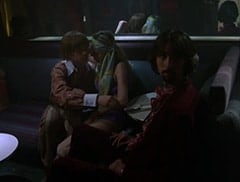
(00:58:26) [“Nah, it’s called S.T.P., it’s really wild, you—”]
PlayOh, the drugs, the rock and roll, the women. Where were they? Ah ha ha. The Beatles gave us a party. They gave us a great party in London um. I’m told it’s a great party; I didn’t actually go. It was the one day I had off, and I went off to see my sister in Thetford, Norfolk (???) when we were over in Europe, in England and, and uh, as I said earlier on, it was John Lennon said, “They’re nothing like the Beatles, they’re more like the Marx Brothers”. I wasn’t really there, so.
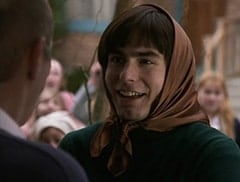
(00:58:56) [Davy goes home to see his dad.]
I remember going home to Manchester, going home to England. This is very, very clear in my mind. I did dress up like a girl, and actually, I went over the back fence. Play’Ello, ’ello, ’ello! I mean, is this what I’ve got to look forward to? Am I going to go bald? I hope not. I’ve only got one hair on my chest, and every time the wind blows, it cracks like a whip, actually. They used to steal the bricks from the wall at the front of the house. You know, it was like there was half a garden wall.
(00:59:35) [“It’s like a non-stop circus.”]
It was unbelievable, really. My dad, he just took it in his stride, and he was very, very proud. In fact, at uh, the front of uh, a couple of, or one of my records now, it says, Play“This is your granddad speaking. When we’re making—at the time I’m recording this, I’m fifty-nine years old”. And it’s kinda weird now, because I’m almost fifty-six myself, so. “I’m fifty-nine years old, and I hope you look after these records as long as I’ve looked after them, and be as nice to your daddy as he’s been to me”. So it was all very family. And I think that’s a lot to do with the reasons I never really got into anything um, other than the normal uh, um, sort of drug of choice at the time, you know. Marijuana, we used to smoke, you know. Kinda silly in a sense when you think about it, because everybody was kind of crazy and sixties and sort of Woodstock and Monterey Pop Festival. I had responsibilities to uh, to my family, and uh, friends that I’d known for years, so I was always a little worried about uh, how they would feel. So that was always the thought I’d had in my mind when we started to over-party.
(01:00:32)
They actually asked me to play my father in this show, which is kind of interesting. That would’ve been a kick. And uh, now having seen the show, and how um, how I feel about it, I really, I really like um, what they did with it, and it’s pretty much true to form, and they’ve taken a lot of those little moments as, that we can remember, you know. One of the best episodes we did as The Monkees, or one of the most uh, watched episodes, was um, when David’s grandfather came uh, over to uh, um, to California, and we tried to uh, um, you know… I was supposedly doing very good and uh, had to show him all these wonderful things that had happened to me and the houses I owned and everything else like that, so. It kind of fitted in with what was going on in my personal life in a sense, although my dad never did ever come to America. Wish he had.
(01:01:26) [Van, Harris, and Don are discussing the next single.]
It’s quite interesting, you know. This is the way business is. All of a sudden, it takes a different, a different road, and all the producers of the TV show um, talk to the music department, the music department supplies the tune, and they put it in. It just happens that Bert Schneider and Bob Rafelson were young guys that were into music. So therefore, the music was a very important part of what they were doing. And you know, as Paul Peterson, that was fine. They chose his tunes. “My dad, here is a man”. Song I recorded. Um and, Ricky Nelson, you know, they did the same thing with him. They chose tunes for him, I’m sure.
(01:02:05)
And the thing about The Monkees’ songs, if you, if you really um, care to um, take time to listen down to some of the albums that we did um, it’s all so different. It wasn’t just any one particular style, you know. You could definitely know and understand that it was The Monkees that were, that was doing it. Uh, but uh, with all these different songwriters um, you’d think that there’d be, you know, some kind of separation in style, but I think as soon as The Monkees did it, then it became, you know, a Monkees sound, even though it was Neil Diamond and Carole King and all the other great songwriters. And this was fun time. I never really enjoyed the studio that much, but the fun thing about it was that, you know, to see Peter, who, as I say, is a great musician, piano player, guitar player, drummer. He plays so many instruments, and very well too.
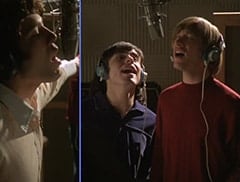
(01:02:52) [The Monkees are recording “All of Your Toys”.]
The way it came about when we all um, went into the studio was they’d present a song to us. This was actually written by uh, Chip Douglas, the producer of um, “Daydream Believer”, who Mike Nesmith brought into the uh, into the um, uh, equation. He, he, he, he produced us, he produced uh, “Elenore” for The Turtles and uh, a couple of their hits as well and a number of other songs for other people. We had a lot of good people around us. It wasn’t just the um, the four of us. Although, we was pretty much overlooked as far as being uh, uh, you know, responsible other than surface for, for the success. We did work together. We did help each other. We did try to, you know, sort of improve on everything we did, and when we got involved with Chip on this particular album, we started making these songs, it was a lot more earthy than a lot of the stuff we’d done, and we actually uh, felt like a band during the filming—the um, recording of this uh, this particular album. We went in a few times later and um, but basically, what would happen was they’d get a song, and they’d say, “Oh, there’s a song, ‘I’m a Believer’ or ‘Daydream Believer’ or ‘Valleri’ or ‘Pleasant Valley’”, and they’d pretty much either give it to me or give it to, to Peter, and Mike really turned down singing tunes. He didn’t want to sing other people’s tunes even. So it was very difficult trying to, you know, sort of like satisfy everybody, you know. When you’ve got four celebrities, you know, four personalities, you know, all for one, one for all was great when we were all together, but then everybody went over to their little worlds and uh, we somewhat forgot about each other, you know.
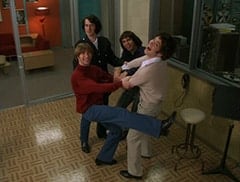
(01:05:10) [The picture for the Headquarters album is taken.]
Uh, that’s the way it always happened with pictures and everything. The best were always just sort of impromptu. But the first album we did um, Here We Come, The Monkees uh, was a, there’s a picture of us sitting on the stairs at the Columbia Ranch, which was the outdoor production facility where we used to shoot certain stuff, and Tommy Boyce took it with a little Kodak Instamatic. You know, if you look at the album cover um, there’s a, the picture on it um, I think two of us were out of focus on it, but um, there again, that was a first. You know, usually you had a head shot, a snapshot, you know. They had us um, semi out of focus, and that was a lot of the technique that we used.
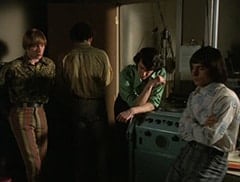
(01:05:50) [The Monkees are arguing about the new album.]
I love this. This must have all happened in one day, because nobody’s hair has gotten any longer or shorter. Ha ha. I used to have this hairdresser, Sally, on the set, and she used to turn my hair underneath at the back, you know. I was the first one to have that sort of like long hair at the back, short hair on top stuff. You know and uh, I remember seeing Bowie down at the um, um, Auditorium in, in, in Santa Monica, California, and all of a sudden, he had the extended Davy Jones haircut. And Bowie, in fact, David Bowie, his real name is David Jones. He had to change it because I already had that uh, that one locked up with the uh, the unions, so. But I don’t think it hurt his career. I think he did quite well, thank you very much.
(01:06:29)
I just didn’t get any of this towards the end, and I was just a bit sort of confused as to why, you know, the, you know, the pirates were taking over the ship, you know, or not co-operating with what was obviously a successful thing for us, and so it was kind of sad, but you know, I just went home and sort of did the other things that I do, you know, uh. I had a couple of motorbikes I used to ride and uh. They’d given us a car, a G.T.O. each, a convertible. All kinds of little—I used to go to school—um, school—I used to go to work every morning, and every morning, on the way to work, I used to pick up this little girl. She’s like fourteen. I’d pick her up, she was there hitching a ride, going to the Hollywood High School, and it was like a, it was like a ritual, it was like. I never saw her out of school. I never saw her at all, but I wonder where she is. I wonder if she’s hearing this now. You know, that would be quite interesting. A cute little girl she was too. I mean, I was only like four years older then myself, but you know. Five years older, but…
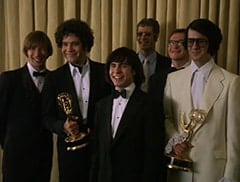
(01:07:20) [The Monkees are at the Emmys.]
Oh man, this is so cool. This is like the um, I think the Emmy Awards. Um, here again, we were all so, sorta green to the, to the whole Hollywood scene. We didn’t, you know, realize how important this was, but eh, got a suit anyway.
(01:07:33) [“Guys, I think this is us.”]
Here we go. I’d been here once before. I was nominated for a Tony Award for the part of the Artful Dodger in Oliver! back in ’63, you know, and uh, to me, that was like, you know, unbelievable. I did say nominated, but. I’ll be back.
(01:07:51) [“…and The Monkees.”]
Eh, oh yeah. Can you believe that? In the midst of all the shows that we’d watched and admired, there we were.
(01:07:59) [The Monkees win.]
Oh my goodness. I wonder how much they had to pay for that? Um, unbelievable. I don’t think I ever saw him [Mike] smile like that. We were pretty uh, see, even the white suit, you know. “Let’s all wear black. Okay, yeah, right, right”.
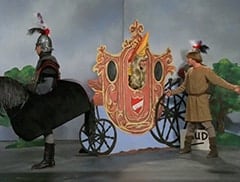
(01:08:21) [The Monkees are filming the episode “Fairy Tale”.]
We all dressed as girls eventually. We all sort of like, we all put the dress on, and the wig, and the whole thing. I thought Nesmith was so funny in this. He was funny, you know. He just didn’t allow himself to enjoy it. That was the problem. You know. Many a time they’d close the set down, because we just kept laughing, and laughing, and we couldn’t do it. So we laughed so much, they said if, “Okay, if you don’t do it this time, we’re closing down until after lunch, and this was at nine-thirty in the morning. I swear. It’s the truth.
(01:08:55) [A sign pointing at the ground reads “MUD”.]
“Mud”. Ha ha ha. Spelled backwards.
(01:09:08) [Peter and Mike are cracking up.]
Ha ha ha. This was most of the time. When we were working together, and we were doing stuff, it was great fun. It’s the down times, and I think you’ll find this with most entertainers, the down times are the hardest. And we just did a lot of pantomime, what we call English pantomime, which is like kids theatre, and uh, that was basically what The Monkees was. I mean, The Monkees, to me, was just like a, a stage show, you know. We could quite have easily, you know, taken it and put it live on a stage, you know, and that’s how improvised—the improvisation of the whole thing, you know. A lot of this dialog was not written. A lot of the stuff we did was not written. It was just like worked around. We worked around it. They gave us like a premise, an idea of what to do.
(01:10:03)
Oh, the black box was something else. I told you about the black box. We used to, after about the first season, there was this um, um, noise uh, that they had to get rid of on the set, and it was the four of us in our little dressing rooms, so they took the dressing rooms off the set, which were like these little cabins, and they put us in a box at the back of the set. They knocked a hole in the wall, and we had a meat freezer cooler door on it. It was thick, about a foot thick, and the walls were—you couldn’t hear a thing, and it had a light in each corner of the room and um, when they wanted me, they flashed this one, that one, the other one, me, and Micky, Peter, and we were out there playing, that’s where our guests used to go, around the back door, and in the back of the studio. And it was quite amazing that uh, um, we ever got anything done the second season. Scripts kinda, in my opinion, just dropped off a little bit, but maybe that was to do with the guys. Maybe it was to do with us. We weren’t so animated and, you know, we had, now with the success more responsibilities personally and otherwise to be able to, you know, sort of like uh, cope with as well as doing these shows. We were at the studio by six-thirty in the morning, and we’d leave the studio and five-thirty and night, and then Micky and I’d go into the studio and record, and that was what the, our life was for a good part of the time we were in The Monkees.
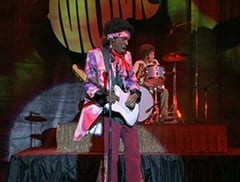
(01:11:18) [Jimi Hendrix is opening for The Monkees in concert.]
Hendrix. That was another story. Jimi Hendrix was playing in the Village, and Micky Dolenz saw him and said, “You know, this guy’s great, you know. He’s sort of like, he lights his guitar and, on fire, and he plays with his teeth”, you know, and we looked at ourselves as sort of like a bit of a circus act in a sense.
(01:11:39) [Jimi flips off the crowd and storms off the stage.]
What about the guitar, Jimi? Throw that at them too. That’s what he did, man, but, you know. He was a cool guy. Spent many an evening, you know, just with him, went fishing with him in Miami, Florida, out on a boat for a day and a half, you know, and just a regular guy, really. I had no idea what was going on in their personal lives, and I didn’t really much care. There was one occasion where Micky and uh, walked into a room where Stephen Stills and Hendrix was there, Joni Mitchell was there um, Graham Nash was there, and they were playing and singing and strumming away, and uh, Micky um, walked in and started, you know, banging sticks on the, on the sideboard or on the table, and I remember quite distinctly Hendrix saying, “That’s what we needed”. So I mean, that was like a little smile on your face, you know. A Monkee playing with Hendrix? And he liked it?
(01:12:30) [Mike is talking about the “dirty money” from the first few albums.]
Yeah. It was tough to convince Mike. It was sort of like, you know, philosophy in a sense that uh, you know, sometimes when you have everything, you know, you just, you just get confused as to, as to what is, you know, what valuable and what is worthy. How worthy you are of it. And I think maybe it comes from childhood. When you’re uh, observed by your parents or your friends or your, and Michael was a loner for the most part. He was always different. He was always sort of out there with another idea. He was from, I think, San Antonio, Texas, so you know, a musician with long hair in San Antonio, you know, in Texas, you know, I mean, wow, in the sixties, I mean, he must have been going through, you know, Play“Are you a boy or a girl, boy?”, you know. Or whatever it was, you know. Not meaning to be prejudice, but it is uh, quite much is how it was in those days, you know. PlayAre you a girl or a boy? You know, that’s what they used to say to me. And I say, “I’m a berk!” Ha ha ha. Figure it out.
(01:13:45) [“At least I don’t spend my entire life high, trying to find some non-existent ‘oneness with the world’.”]
Ha ha ha! Maybe I should have! Ha!
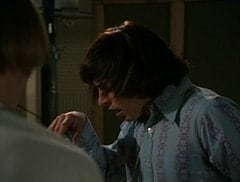
(01:13:54) [Peter punches Davy.]
A-ha! Yes, he did do that, folks, but not the dialog that you just heard. It was something entirely different. PlayPeace, love, waterbeds, Hare Krishna, brown rice… what about the seven stitches I had to have in my eye? We settled that one with a little bit more aggression, but uh, we won’t go there.
(01:14:15) [Van and Harris are discussing the show.]
Yeah. I don’t think ever this kind of dialog was, you know, like, you know. I don’t think we were supported by Schneider and Rafelson. I never saw it. They never showed me any, any support whatsoever. I was just a, a player in a piece, and that’s what I wanted to be. I was an actor. I had to do a part, and that was the part I played.
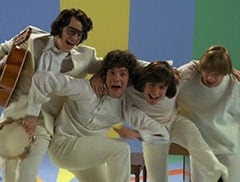
(01:14:36) [The Monkees are performing “Daydream Believer” in the Rainbow Room.]
Chip Douglas was very instrumental in grounding all of us. And um, he um, that guitar there, I’ll tell you a story about that too um, or a similar guitar um. He was very instrumental in grounding us all. He took us in and produced us when we did uh, Headquarters album. He brought good songs to us like, you know, “Steam Engine”, “Toys”, and especially “Daydream Believer”. I have another song called um, “She Believes”, written by Neil uh, by um, uh, John Stewart, who wrote “Daydream Believer”. I still have it in my uh, music uh, room uh. It’s ready to record, it’s, it’s. This, this kicked us off again in ’68. This was our really last major, major, major, major hit, and I think one of the, one of the more remembered songs, so, you know. What you do last is usually the uh, is the way people think about you. But you know, the fun of Micky even, you know, sort of like, goofing around, and the idea of us playing there, obviously, we’re playing to track um, but there was nothing said about that. Sometimes it was okay, and other times it wasn’t, so, you know. And here’s me, just, you know, wiggling my hips and, you know. Ha ha ha. I guess these guys must have looked at this video a couple of times because they, I really can’t tell the difference, you know. I mean we’re, I have great, great admiration for these actors because I think they really depicted us quite well. And although a couple of the uh, moments are just, you know, repetitive, in my mind anyway, to as what we did on the TV show. I guess that’s what a movie’s about when you, when you um, you know, sort of try and interpretate, interpret what other people uh, you know, did it, but um, I think they’re faultless. I think, I think they’re really cool. I’m really glad they did it, you know. And they say, you know, uh, that this is the highest form of flattery, when somebody imitates you, so what do you know, guys? I’ll have to tell the guys at home, they finally made a movie about me, me and the guys. But um, there was a lot of good times. You know, more good than bad, you know. It’s like the world; there’s more good in the world than there is bad, but, you know, we always tend to focus on the unhappy moments and the bad things that happen to us, but I think we getting better. Um, you know, I think we getting better.
(01:17:36) [The Monkees are filming the episode “Monkees on the Wheel”.]
Here we go. Who is this little brute that just walked in?
(01:17:48) [“This face is worth millions, you know.”]
Yeah, right. Actually, I think we getting canceled.
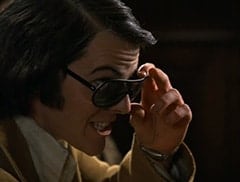
(01:14:56) [“Son. Jack Nicholson.”]
Ha ha ha. Ha ha ha. I like this guy! He’s good. He looks like Jack Nicholson’s illegitimate son.
(01:18:11) [“The network said no to the changes that we wanted to make.”]
Oh. Yeah, we talked about doing uh, uh, a different format. Really, basically, what Laugh-In turned out to be. Like a variety show. We were getting guest artists on there uh, but, in the second season, we started to bring in sort of Tim Buckley was on and I had a guy called Charlie Smalls. Charlie Smalls was the guy that wrote The Wiz um, and I’ve got a tape of him in my living room, in England, in, um, Hollywood, playing “You can’t win, you can’t break even, can’t get out of the game” and all the other songs from The Wiz. It’s priceless. One day, I’m gonna hook up with his son um, um, I haven’t seen him in thirty-five years uh, um, and I’ve got, I’ve got—Michael, his name was—and I’ve got, I’ve got videos of him as a little kid and everything. I understand he’s a director in New York or producer or choreographer. I’ll have to look him up and give him the tapes that uh, I’ve got of his dad.
(01:19:06)
But this was cool with Nicholson. Nicholson came into the scene, you know, as a friend of Rafelson and Schneider. They’d worked together on projects pre-Monkees and probably didn’t get them off the ground, and uh, all of a sudden, they pulled him uh, in, and Jack was much the same as Clint Eastwood. He’s been making sort of like spaghetti westerns and doing small parts here and there. If you looked through his um, roster of uh, things he did way before he was uh, Jack Nicholson to the world, and you’ll see some really funky stuff. At the time, they’d just finished making um, Easy Rider, and Schneider and Rafelson contributed seventy-five thousand dollars to finish the movie uh, with Peter Fonda, and Jack was in it, and Dennis Hopper, and um, a number of other people, and uh, they gave them seventy-five thousand dollars for, I think, two percent, three percent of the movie when it came out. Maybe it was more. And obviously, it made millions at the time, which was high um, um, high grossing for an, for an independent film. Especially with the content and the kind of storyline that it had, but um.
(01:20:00)
Nicholson came into the scene. We all went off to uh, Del Mar or um, and we spent a weekend, three days um, with a tape recorder, and we all threw our ideas out and decided, you know, where we wanted to go with it, what should we do with this, how are we gonna… Well, everyone had different ideas. So we took the four personalities, Micky was, you know, funny man, he just like joked the whole thing. Peter was like Hare Krishna, waterbeds, brown rice, you know. Um, Mike Nesmith was the businessman, and I was the uh, sort of like guy said, Play“Who said that? I’ll punch him!”, you know. So being a little guy, I was a little feisty and sort of always in the mix, but uh, we all got together for a weekend, Schneider, Rafelson uh, Nicholson, Nesmith, Tork, Jones, and Dolenz, and we all sat and talked, wrote our ideas, taped them. I would love to have that tape right now. I’d love to listen to that tape, because there was a lot of stuff obviously that we didn’t do. We all had ten good, ten ideas and only one of them was good, but. These guys really, you know, it was a bit of a joke, you know. I mean, we were using people’s money to make a movie, not a lot, I think they spent about a couple hundred thousand dollars. Each episode of The Monkees, if you can believe it, was, cost thirty-five thousand dollars, which was ridiculous.
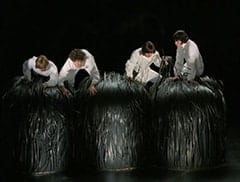
(01:20:58) [The Monkees are filming the dandruff scene in Head.]
And this to me, this was uh, this would, to me, explain my feelings about Schneider and Rafelson. I, I—We were playing dandruff in Victor Mature’s hair, okay, in the Monkee movie Head. Dandruff, dandruff. I think that’s the value they put on us, to tell you the truth, and that would sort of like hold true with some of the things I’ve said so far about these guys. Um, they were never very helpful to us, other than uh, they gave us the opportunity to do what we did. I guess that was everything.
(01:21:29) [Harris tells The Monkees the show has been canceled.]
We, we hoped to uh, to you know, to go on, but I think Rafelson and Nicholson went on to do um, King of Marvin Gardens and um, uh, uh, a couple of other things that uh, Rafelson produced. I don’t know what Schneider’s doing these days, but I, he owned the rights to The Monkees and sold them on to Rhino Records for two or three million dollars and, and now, I think uh, Harold Bronson’s retired, the executive in charge of the Monkees project over at Rhino. I think he’s quit the business and uh, taken that uh, magic carpet ride to um, to retiredom, I don’t know but um. We’ll see. He’ll probably be back with a new record company. He was actually uh, uh, just um, a guy that had a record shop in Santa Monica um, and uh, he, he went on to be a, a very powerful record executive uh, and so anything is possible um, you know. When you’ve got success um, uh, everyone wants to know you um, you know. The times that I’ve been given um, and offered stuff, it’s amazing, and then other times, you know, when you need stuff, then, nobody uh, nobody’s there for you, so. Success is, phew, it’s got a little trickery to it.
(01:22:42)
I’m not saying there weren’t any girls around in our lives because everybody um, you know, I think we all had girlfriends at the time. I don’t think I had a steady girlfriend. I, soon after um, soon after um, um, The Monkees started, ’68, I was married, and uh, had a little baby, and that was towards the end of the Monkee run. The Monkee movie Head was uh, was um, was um, a good movie. The only problem with it was that, you know, our fans couldn’t get in to see it because it was rated um, for adults, so you know, it was a movie that really should have been made at the time. Not with The Monkees. I was thinking more of like Road to Hong Kong or you know, sort of like The Marx Brothers go to, you know, Beijing, I dunno. Instead of that, we um, we made this controversial movie about the Vietnam war and about philosophy and, you know, as I say, we had four different ways of getting out of the black box. We used the black box. We used Victor Mature. We had Annette Funicello, Sonny Liston, Ray Nitschke from the Green Bay Packers. I mean, this was all conversations that we had during the course of this uh, meeting, and that’s how that movie came about. They paid us a thousand dollars for doing the movie, and that was it, and it’s, I guess that was it um.
(01:23:46)
We didn’t show up for the first day’s filming. Micky, Peter—Micky, Mike, and myself. Peter showed up. And if you look at the movie now, you’ll see that Peter has a swollen face. He has a nose on him. He’d got bitten by a bee over the weekend or something. He was the only one that showed up, because by this time, Mike Nesmith had gotten uh, Jerry Perenchio to be Micky, mine, and his agent, you see. The manipulation was beginning, and the separation was, had already begun. Peter was, you know, now Bert Schneider and Bob Rafelson’s, you know, um, um, friend more than he was ours, but uh. It’s quite interesting how the events came about. Lot of music, lot of traveling, a lot of work, you know. Very little time to really spend on your, on your personal life, and I think that was the hardest thing about being in The Monkees that um, I wasn’t able to really, you know, sort of have any sort of long-term relationships during that period uh, that would last anyway. It’s all happened since. And obviously my school friends before and at home.
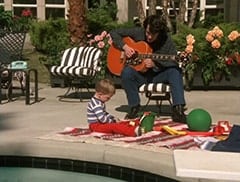
(01:24:59) [Mike is talking to Christian about success.]
I can’t believe how, how, how alike this guy is to Mike. He looks just like him. Wow, it’s unreal.
(01:25:06) [“I just keep hearing those same words: someday, someday.”]
Yep. Someday, someday. And he’s still saying it, you know. Despite all the success and, but I think most artists must be like that. They’re never satisfied. It’s the down times, you know. Those are the hardest ones. That’s why all of your, you know, your uh, celebrities, you know, get themselves in trouble, with uh, whether it be drugs or… not just celebrities, a lot of people. It’s the down time. Once you’re out there, and they’re screaming and shouting, and people are all over you, and it’s not happening anymore, then, you know, you go somewhere else. I guess it’s just an actual, you know, process, really.
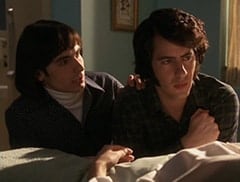
(01:25:43) [Mike is with Phyllis in the hospital.]
This was an amazing experience. Being Christian Scientist, she was in a car crash, and she really smashed herself up a lot. I understand she had scars, deep ones, all over her face and such. And uh, the Christian Scientist um, um, um, head of the hospital uh, uh, ward, I guess, I dunno if there’s any such thing um, came and doctored her up and magic’ed away the, the scars, you know, and that gave uh, validity uh, uh, uh, to uh, to this um, idea that, you know, Christian Scientists don’t go to um, hospitals. They don’t see doctors, they don’t uh, it’s a self-healing thing, which is, I believe it’s possible, but, you know, um, you know, when you’re bleeding to death, I, you know, you need blood.
(01:26:24)
I stayed with Mike too for a while, in between the pilot and the um, and the airing of the first episode in September ’66 uh, soon after moving in with Micky uh, but I stayed with Mike and his, and his wife Phyllis and little Christian in his house up on Sunset Plaza Drive in Hollywood.
(01:26:44) [A boy with a cast approaches Mike, while Davy talks with a girl in a hospital bed.]
I think at this part, they’re relating to a story. There was these two beautiful young girls uh, Patty and Rhonda from, from Phoenix and they had crossing the street and uh, they’d got run over. They were carrying their Monkee albums, and they’d said uh, they wanted to um, you know, see Davy Jones, and so I flew off the Phoenix, Arizona and I uh, I uh, met with them, and then I kept going back, time after time. I met a couple of nice people there. Tiff and Claire Loufer (???), an old prospector, cowboy hat and in the desert there, you know, went to visit him a lot too. So I was enriched by the experience and uh…
(01:27:25) [“It’s like… Monkee magic!”]
…and the Monkee magic. Yeah, right.
(01:27:38) [“Now why didn’t somebody tell me that two years ago?”]
It wouldn’t have mattered, Mike. Yeah. We did get the chance to travel, and it was hard work. It wasn’t just as you saw it. It’s not just this. It’s a lot more to it. It was, it was a lot of things. I mean, we had a very full schedule. I mean, thankfully we did, because we were all young guys.
(01:28:08) [“We’ll sing, but on one condition.”]
PlayWait for this.
(01:28:17) [The Monkees start singing the theme song.]
Now Peter will never sing this song; he hates it. I don’t know why. This was our theme song. Not everybody has a theme song. As I was saying, you know, I mean, this is the key. This is an identifiable thing. It’s identification. And I know where that is; that’s Santa Barbara, California (It’s actually Sunnyside Pavilion in Toronto, Ontario), right there. I know that little sidewalk. I had a house in Santa Barbara for a long, a long time.
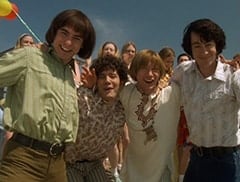
(01:28:51)
Um, the Monkee walk, I think that’s a variation on “We’re off to see the Wizard”, isn’t it, really? Hey, see, you can’t claim parentage. Ha ha ha. Yeah. PlayWe’re off to see the Wizard, the wonderful Wizard of Oz.Ha! Well, you know, despite all this, you know, Playthey’re brothers. They always will be. They were the greatest.